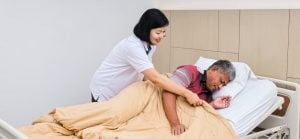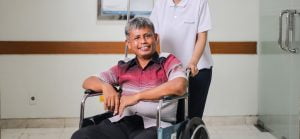For pregnant women and their families, preparation before and after giving birth is an important thing that should not be missed, especially in the third trimester or the last three months of gestation. There is a tendency for pregnant women to focus more on preparation before giving birth. In fact, the period after giving birth is longer so it requires more careful preparation.
Tips for Preparations Before Childbirth
Preparing for childbirth includes several aspects related to the labor process that require prime physical and mental condition. It is normal for pregnant women to feel nervous or worried before giving birth, especially for mothers who are just pregnant with their first child. Here are some prenatal preparations suggestions:
Take a maternity class
Maternity class is usually available in hospitals. Here, you can get answers to every question about childbirth. This class is generally attended jointly by a number of mothers-to-be so that you can also exchange ideas and experiences with them.
Take a breastfeeding class
For new mothers-to-be and have never breastfed a baby before, breastfeeding classes are very important. In this class, you will be taught how to hold your baby while breastfeeding, how to properly put the baby’s mouth in the nipple, and how to know when the baby is full. Like the maternity class, the breastfeeding class is also available in the hospital.
Take a parenting class
Mothers and husbands who do not have parenting experience should also take a parenting class. Through this class, you will be helped to understand the stage of child growth and development, how to ensure the safety of children, know the signs that children need medical emergency help, umbilical cord care, and how to bathe the baby and wear diapers for the baby.
Prepare the suitcase
Approaching the due date, it is best to prepare a suitcase containing all the things needed for childbirth and recovery afterwards in the hospital. For example, clothes for mothers and babies, diapers, toiletries, blankets, baby oil, and others. Make sure this suitcase is placed within easy reach so that when the mother has contractions and there are signs of childbirth, it can be immediately snatched to be taken to the hospital.
Prepare baby facilities at home
Make sure you have designed a room for the baby. The baby may sleep with parents in a room, or they are put in a separate room. Other facilities include toiletries, clothes and pants, diapers, and toys.
Be mentally strong
Preparation before and after childbirth requires a strong mentality, especially for mothers who have never given birth. In a 2015 study, it was concluded that mental preparation for young mothers is vital in the run-up to delivery. If there is preparation, the mother’s mentality is stronger when undergoing labor which can be very energy-consuming and mentally draining.
Yoga and Pregnancy Exercises
Yoga classes and/or pregnancy exercises are usually taught to mothers-to-be during before and after giving birth preparation. Yoga and pregnancy exercises are beneficial for mothers before childbirth. But yoga and pregnant exercises have differences. Yoga is a common exercise. It can be performed not just for pregnancy. Meanwhile, pregnancy exercise focuses on pregnancy and education about childbirth.
In addition, yoga is more helpful to provide calm and to strengthen the mind before childbirth. As for pregnant exercise, it is a series of movements aimed at increasing flexibility and muscle strength and overcoming the disturbing symptoms of pregnancy in the run-up to delivery.
Normal Birth Vs Caesarean Birth
Mothers are often faced with two choices of ways of giving birth, normal and caesarean section. It should be emphasized here that both are equally good ways to give birth. However, there are many differences between the two. For instance:
Normal birth
- Faster recovery
- Faster attachment to the baby
- Can give breast milk immediately after the baby is born (early initiation of breastfeeding)
- Bleeding complications may occur
- You may need tools, such as a vacuum or forceps, which are risky for your baby
- More energy and mental drain
Caesarean birth
- Can schedule delivery
- Less risk of injury to the baby during delivery
- It is safer if the mother has complications during pregnancy
- Recovery takes longer
- There are scars from surgery
- Surgery can lead to complications
- The risk of surgery for the next birth is higher
How to Stay Healthy After Giving Birth?
Health is the key to a good quality of life. After giving birth, mothers will inevitably undergo many changes, including in maintaining healthy habit. However, mothers should still pay attention to physical or mental health after giving birth. Here is how to do it:
- Keep exercising regularly, for example by walking with the baby in the stroller in the morning
- Maintain a disciplined diet despite the urge to eat more, especially for breastfeeding mothers
- Make sure to always have a balanced nutrition diet to make sure the nutritional needs of the mother and baby are met
- If you wake up often at night, try to take a nap the following day to make sure you get enough rest
- Stay away from toxic and harmful substances from cigarette and vehicle smoke, alcohol, and others
- Consult a psychologist if you feel that your mental health is impaired
How to Care for a Newborn?
According to the World Health Organization (WHO), newborns have the right to get the best quality of health services. In the first days after the birth of the baby, parents should be attentive to the umbilical cord. Be sure to wash your hands when you are about to take care of the umbilical cord. No need to apply anything to the umbilical cord. The umbilical cord also doesn’t need to be covered with gauze, diapers, or cloth. Do not immerse the umbilical cord or expose it to urine/baby faeces. Wash the umbilical cord with clean water and soap, then use a clean cloth to wipe it. The umbilical cord can come off on its own. If there are signs of infection, such as swelling, redness, or a bad smell, see a doctor immediately.
How to Bathe a Baby?
You don’t need to bathe a newborn baby because there is still a layer that protects them. Six hours after birth, you can wash your baby with a cloth and warm water. As long as the umbilical cord is still in place, use a warm cloth or sponge to bathe the baby. Your baby can only be bathed in water when the umbilical cord has come off. Be sure to use warm water as well as special baby soaps and shampoos.
Finding the Right Postpartum Care
Postpartum healthcare is essential. It can also be incorporated into the preparatory plan before and after childbirth. Mothers are advised to undergo health control by a doctor/midwife at least four times: at 6 hours, 6 days, 2 weeks, and 6 weeks after delivery. Postpartum care can be obtained at the birthing place or at other health facilities. It is best to prioritize the health care providers that are easily accessible from where you live. It is also important to ensure that the health center is able to provide everything necessary for the health of the mother and the baby.



